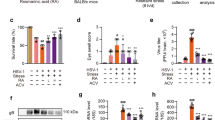Abstract
This study shows that the influence of different stress factors impacts the reactivation of latent herpes simplex virus type 1 (HSV-1) specifically in the trigeminal ganglion of infected mice. Different stress factors including hyperthermia, hypothermia, fatigue, and immunosuppression were exerted on mice infected with HSV-1. These viral antigens were then detected in the trigeminal ganglion region of infected mice under the influence of each stress factor, with hyperthermia having the most influence on reactivation. Interestingly, an increase in IL-6 was also detected in mice subjected to hyperthermia. These studies therefore suggest that stress can induce the reactivation of latent HSV-1, possibly through the induction of IL-6, in the trigeminal ganglion region of infected mice. This reveals a new insight on the pathogenesis of relapse infection of HSV-1.






Similar content being viewed by others
References
Whitley, R. J. (2006). Herpes simplex encephalitis: Adolescents and adults. Antiviral Research, 71(2–3), 141–148.
Tyler, K. L. (2004). Herpes simplex virus infections of the central nervous system: Encephalitis and meningitis, including Mollaret’s. Herpes, 11(Suppl 2), 57A–64A.
Bisson, J., & Andrew, M. (2005). Psychological treatment of post-traumatic stress disorder (PTSD). Cochrane Database of Systematic Reviews, 18(2), CD003388.
Peskind, E. R., Bonner, L. T., et al. (2003). Prazosin reduces trauma-related nightmares in older men with chronic posttraumatic stress disorder. Journal of Geriatric Psychiatry and Neurology, 16(3), 165–171.
Kloet, R. E. (2003). The effect of vitamin E on stress-induced changes in visual evoked potentials (VEPs) in rats exposed to different experimental stress models. Endocrine Regulations, 37(2), 51–68.
Yargicoglu, P., Yaras, N., et al. (2003). Hormones, brain and stress. Acta Ophthalmologica Scandinavica, 81(2), 181–187.
Djordjevic, J., Cvijic, G., et al. (2003). Different activation of ACTH and corticosterone release in response to various stressors in rats. Physiological Research, 52(1), 67–72.
Anglen, C. S., Truckenmiller, M. E., et al. (2003). The dual role of CD8+ T lymphocytes in the development of stress-induced herpes simplex encephalitis. Journal of Neuroimmunology, 140(1–2), 13–27.
Nagamine, M., & Shimizu, Y. (2003). Effects of personal controls on cortisol secretion during stress processes. Shinrigaku Kenkyu, 74(2), 164–170.
Hill, J. M., Lukiw, W. J., et al. (2001). Gene expression analyzed by microarrays in HSV-1 latent mouse trigeminal ganglion following heat stress. Virus Genes, 23(3), 273–280.
Jiang, H., Guo, S., et al. (2002). Activity decrease of NK cells in spleen induced by cold stress and express of c-fos in brain. Chinese Journal of Applied Physiology 18(4), 313–316.
Li S., , Zhang, X., et al. (1997). Different contribution of mice exhaust swimming trial and cold stress to stress immunosuppressive protein. Journal of Peking University, 29(4), 323–325.
Chesnokova, V., & Melmed, S. M. (2002). Neuro-immuno-endocrine modulation of the hypothalamic-pituitary-adrenal (HPA) axis by gp130 signaling molecules. Endocrinology, 143(5), 1571–1574.
Cichon, M., Chadzinska, M., et al. (2002). Delayed effects of cold stress on immune response in laboratory mice. Proceedings of the Royal Society of London Series B: Biological Sciences, 269(1499), 1493–1497.
Oisakran, S., Halford, W. P., et al. (1998). Role of the hypothalamic pituitary adrenal axis and IL-6 in stress-induced reactivation of latent herpes simplex virus type 1. Journal of Immunology, 160(11), 5441–5447.
Borg, S. A., Kerry, K. E., Baxter, L., et al. (2003). Expression of interleukin-6 and its effects on growth of HP75 human pituitary tumor cells. Journal of Clinical Endocrinology and Metabolism, 88(10), 4444–4938.
Song, H., Binh, V. Q., Duy, D. N., et al. (2003). Serum cytokine profiles associated with clinical presentation in Vietnamese infected with hepatitis B virus. Journal of Clinical Virology, 28(1), 93–103.
Danaher, R. J., Jacob, R. J., Chorak, M. D., et al. (1999). Heat stress activates production of herpes simplex virus type 1 from quiescently infected neurally differentiated PC12 cells. Journal for Neurovirology, 5(4), 374–383.
Song, J., Ohkura, T., Sugimoto, M., et al. (2002). Human interleukin-6 induces human herpesvirus -8 replication in a body cavity-based lymphoma cell line. Journal of Medical Virology, 68, 404–411.
Song, J., Ohkura, T., Sugimoto, M., et al. (2002). Human interleukin-6 induces human herpesvirus -8 replication in a body cavity-based lymphoma cell line. Journal of Medical Virology, 68, 404–411.
Acknowledgment
This research was funded by the National Natural Science Foundation of China (no.30900456/C090301) and the National Basic Research Program of China (973 Program no.2009CB918300).
Author information
Authors and Affiliations
Corresponding author
Rights and permissions
About this article
Cite this article
Huang, W., Xie, P., Xu, M. et al. The Influence of Stress Factors on the Reactivation of Latent Herpes Simplex Virus Type 1 in Infected Mice. Cell Biochem Biophys 61, 115–122 (2011). https://doi.org/10.1007/s12013-011-9167-7
Published:
Issue Date:
DOI: https://doi.org/10.1007/s12013-011-9167-7




